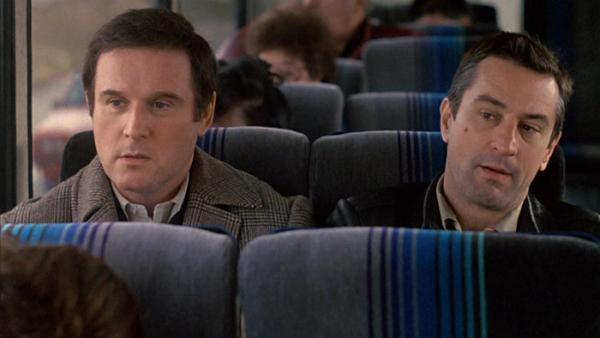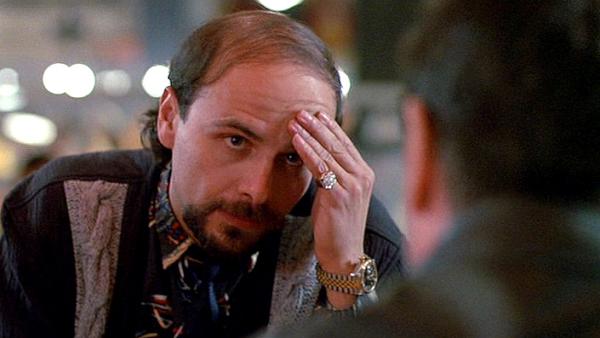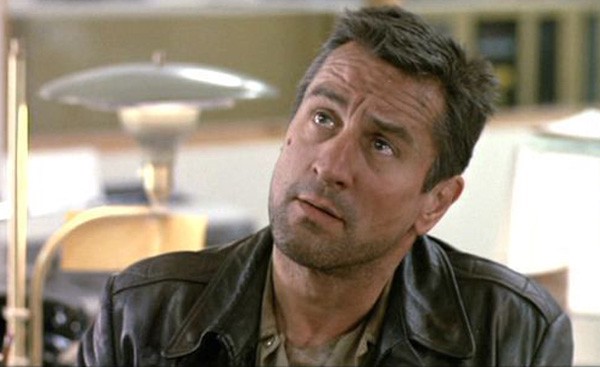

'Midnight Run' 30th Anniversary of Robert De Niro Being A Much Better Bounty Hunter Than Boba Fett
By Brian Richards | Film | July 31, 2018 |
By Brian Richards | Film | July 31, 2018 |

Every artist, once they have mastered their chosen skill set, has experienced the feeling of wanting to try something new, something different, something that will test their capabilities to see if they can be applied elsewhere. Michael Jordan, the greatest basketball player of all time, tried playing minor league baseball. Stephen King, one of the greatest horror novelists to have ever lived, tried his hand at writing and directing a film, and Maximum Overdrive turned out to be such an unwatchable, cocaine-fueled disaster that he would later refer to it as his “moron movie.” Steven Seagal, one of the biggest action stars of the Nineties (and also one of the biggest pricks in any decade) decided that he wanted to record a reggae album. (Yes, you read that correctly, and if you’re a glutton for punishment like myself and you’re willing to listen to his vocals, click here.) Robert De Niro, considered by many to be one of the all-time greatest character actors, wanted to try something different after appearing in The Godfather Part II, Raging Bull, Once Upon A Time In America, and The Untouchables. He had starred in plenty of dramas, and he now wanted to take a shot at doing a comedy.
Which is not always the easiest or most successful transition for any dramatic actor to make. For every Jon Hamm or Laurence Fishburne who proves to be as adept and skillful at comedy as they are at drama, there’s a Steven Seagal who turns out to be just as good at comedy as he is at performing reggae. Fortunately for De Niro, he chose wisely in terms of what comedy he would appear in. That comedy was not Big, which De Niro originally auditioned for and lost to Tom Hanks, but Midnight Run, which opened in theaters on July 20, 1988.
Jack Walsh (De Niro) is a former Chicago cop now working as a bounty hunter out of Los Angeles. After years of risking his life by going after bail jumpers and getting shot at while doing so, he wants nothing more than to leave bounty hunting behind, and live a much quieter life. His deceitful, fast-talking boss, Eddie Moscone (Joe Pantoliano), presents him with the opportunity to do so, in the form of Jonathan “The Duke” Mardukas (Charles Grodin), a mild-mannered accountant who stole $15 million from Las Vegas mobster Jimmy Serrano (Dennis Farina), and donated the money to charity. Eddie has one week to ensure that Jonathan appears in court, or else he’ll lose his business, so he recruits Jack to find him and bring him in. Which Jack is willing to do for $100,000, and what seems at first to be a ‘midnight run’ (slang for an easy job) turns out to be the complete opposite of that.
Jack and Jonathan find themselves being pursued by the FBI, led by Alonzo Mosely (Yaphet Kotto), who wants to bring Jonathan into custody so that he can testify against Serrano; Tony and Joey (Richard Foronjy, Robert Miranda), Serrano’s associates (or as Serrano lovingly calls them both, Moron Number One and Moron Number Two) who have every intention on putting Jonathan into the ground to keep him from testifying; Marvin Dorfler (John Ashton), a rival bounty hunter and Jack’s frenemy, who is determined to take Jonathan (and the profits that come with him) all for himself; Eddie constantly questioning Jack’s capabilities by sending Marvin after him; Jerry, Eddie’s receptionist, who is working as an informer for Serrano; and then there’s Jack and Jonathan getting on each other’s last nerve every step of the way. Jonathan tries repeatedly to learn more about Jack, while trying to convince him to let him go and not leave him to be killed by Serrano. Jack is determined to bring Jonathan in and get his reward no matter what, only to find that more and more difficult as he begins to see Jonathan as more than just a means to an end.
One way to explain and describe what kind of film Midnight Run is, and why it’s so effective in all of the things that it does, is that it’s Planes, Trains, and Automobiles with guns. Two people who don’t know or trust one another, and their bond slowly but surely becomes stronger as they get to know each other better. They’re also being forced to deal with the difficulties of traveling around the country, which all of us have dealt with in one form or another. (Just try taking the subway to work during morning rush hour in New York, and see if that doesn’t leave you wanting to scream every profanity in all of existence). Midnight Run doesn’t pack the same kind of emotional gut-punch as Planes, Trains, and Automobiles, but there’s still plenty going on beneath the surface to make you care about these two men, while also laughing your ass off as they take turns pissing each other off and trying to trip each other up, as they go from one end of the country to another.
There are several reasons why Jack is determined to walk away from his job as a bounty hunter. Eddie Moscone, whose lack of professional integrity, and the fact that getting money from him is like pulling teeth while blindfolded and handcuffed, is fairly high on that list.

Besides that, Eddie constantly doubts Jack’s ability to do his job, and keeps sending Marvin after him and his quarry, which is enough to make you wonder why he doesn’t just hire Marvin to work for him. He’s pretty much the kind of boss that makes you so damn happy to finally quit your job and walk away for good like you’re Peggy Olson with sunglasses on, and a cigarette dangling from your lips.

During a scene near the end of the film, Jonathan tells Jack that the reason why Jack has an ulcer is because he only has two responses to everything he deals with: silence and rage. This description could easily be applied to FBI Special Agent Alonzo Mosely, though you could also add irritation and contempt to that list of reasons, which he conveys at everyone who crosses his path. Jack, for going after Jonathan and getting in his way. Marvin (whose cigarettes he keeps confiscating for himself every time they see each other), for going after them both and also getting in his way. Even his fellow agents, who constantly state the obvious and fail to remember the wise words of one Raylan Givens: Don’t say shit unless you know for sure it helps. (The fact that Yaphet Kotto had an unpleasant working relationship with Martin Brest probably made it a lot easier to express through his performance how pissed-off he was feeling while on set.)

Speaking of people who regularly convey irritation and contempt, Mosely has got nothing on Jimmy Serrano, who makes it absolutely clear to his henchmen, and his attorney, Sydney (Philip Baker Hall), that he does not tolerate failure, and that he is willing to carry out many an act of violence due to failure or just because he wants someone to shut the hell up and stop getting on his very last nerve. Serrano is also responsible for the film’s most chilling moment in which he faces Jonathan in the back of his car and goes from expressing joy about having finally captured him to expressing absolute menace as he lets Jonathan know that not only will he die, but that he will go home and enjoy a delicious meal before finding his wife and killing her too. Not too many character actors are able to convince the audience that they are capable of unleashing indescribable mayhem by simply lowering their voice, but Dennis Farina had that quality in spades.

There is one scene where Jonathan makes it clear to Jack that he doesn’t need or appreciate him pretending to care about him or his well-being when all he really cares about is getting his money, and Jack makes it clear how upset and offended he is by that accusation. But if you’re looking for a bounty hunter who lives up to that perception, you’d have Marvin Dorfler, who is just as persistent as Jack when it comes to doing his job, but has fewer morals, and is nowhere near as smart as he thinks he is. Hence why he regularly gets knocked the fuck out by Jack whenever he tries to interfere with him doing his job, and why he ends up getting knocked the fuck out yet again when his attempt to sell Jonathan to the highest bidder blows up in his face, and pretty much leaves him with nothing.

Quick-thinking, kind-hearted, and very talkative, Jonathan “The Duke” Mardukas struck back at Jimmy Serrano the only way he knew how after discovering that the legitimate office he worked in was really nothing but a front for one of Serrano’s illegal operations: through his wallet, and took $15 million of his money and donated it to charity, while also reminding him of his act of defiance as often as possible. Once he finds himself in Jack’s custody, he’s willing to say and do anything to keep from arriving in Los Angeles, from lying about his fear of air travel (as well as the fact that he’s actually a trained pilot), to jumping on a speeding train while almost leaving Jack behind. At the same time, he’s trying to convince Jack that his life is worth saving from Serrano’s grasp, while also learning more about Jack, and what a good and honorable man he is, and that he’s not just a thug who only cares about getting a huge chunk of cash, no matter how hard he tries to pretend otherwise.

Jack Walsh lost his job, his family, and his home all because Serrano made him an offer he couldn’t refuse, and unlike many of his fellow officers in Chicago, he turned it down, and has been a bounty hunter ever since. It isn’t until he goes after Jonathan, another honorable man whose life was torn apart because of Serrano’s manipulations, that he fully realizes how much of a toll the last nine years have taken on him, as evidenced by his awkward and painful reunion with his ex-wife, Gail (who is now married to one of the corrupt cops who forced Jack to leave Chicago), and his now-teenage daughter, Denise. From the moment Jack and Denise lock eyes, it’s evident that there is so much that the two of them need and want to say to each other, but there isn’t nearly enough time to say it all.
It’s his bond with Jonathan, and his refusal to turn his back on him, that results in Jack not only saving Jonathan from certain death, but also bringing down the man responsible for forcing him to walk away from everyone and everything that mattered to him. Once that happens, after he’s finally able to accomplish this after a decade, taking Jonathan in and throwing him to the wolves no longer holds any appeal for him. It’s all of these performances by Joe Pantoliano, Dennis Farina, John Ashton, Charles Grodin, Robert De Niro, and the supporting cast, guided by the remarkable direction of Martin Brest (who made this after directing another successful action-comedy known as Beverly Hills Cop), George Gallo’s first-rate screenplay, and Danny Elfman’s superb and catchy score, that made Midnight Run more than just another action-comedy that only cared about bullets and slapstick.
The success of Midnight Run made it much easier for Hollywood to follow in the film’s footsteps in terms of releasing more action-comedies focused on mismatched pairs who can’t live with each other, and yet can’t live without each other: Fled, starring Laurence Fishburne and Stephen Baldwin, before his brother William kept embarrassing him on Twitter over the stupid shit he was willing to type out); The Rundown, starring Dwayne “The Rock” Johnson and Seann William Scott, (and no, not the unfortunately short-lived late-night talk show hosted by Robin Thede); and All About The Benjamins, starring Ice Cube and Mike Epps. It also put Martin Brest on the fast track to making other films that were memorable for both good and bad reasons, such as Scent of a Woman, which won Al Pacino his first-ever Academy Award for Best Actor (an award that should’ve been hand-delivered by Dustin himself to Denzel Washington for his performance in Malcolm X, but let me stop before I start ranting like Dennis Miller back when his rants could actually be considered funny); Meet Joe Black, which is not remembered because of the performances of Brad Pitt as Death or Anthony Hopkins as the wealthy businessman who accompanies Death as it learns more about what it means to be human, but is remembered for this one scene:
And finally, Gigli, which not only paired Ben Affleck with Jennifer Lopez both onscreen and off, but was also the second worst thing to happen to Affleck other than that phoenix tattoo he has all over his back, a tattoo that made his estranged wife Jennifer Garner, in this interview with Vanity Fair, throw enough shade in his direction to cover all of Texas.
One thing is for sure: she refuses to claim responsibility for the midlife-crisis tattoo —the rising phoenix— that takes up her estranged husband’s entire back, as seen in photographs. “You know what we would say in my hometown about that? ‘Bless his heart.’ A phoenix rising from the ashes. Am I the ashes in this scenario?” Garner says with a wink.“I take umbrage. I refuse to be the ashes.”
As if the Eighties and early Nineties don’t already teach us that adapting popular movies into television series doesn’t always work (Ferris Bueller, Working Girl, Dirty Dancing), Midnight Run was also adapted for television, in the form of two made-for-TV sequels/spinoffs that aired in syndication: Another Midnight Run and Midnight Run For Your Life, starring Christopher McDonald as Jack Walsh, and Dan Hedaya as Eddie Moscone.
Despite all of the gunfights, the profanities that would make David Mamet himself cover his ears, and the hard-won emotion that avoids any easy sentimentality, Midnight Run is, at its heart, a workplace comedy. One that reminds us all what it’s like when you’re stuck in a job that you hate, with a boss who barely respects you, and when you have to interact with strangers who make you want to punch them in the face, while also working with people whose idea of success is making sure that you fail. All while trying to keep your head above water, and not lose your humanity in the process.
And who among us can’t relate to any of that?
← The Creepiest and Most Sexist Comments Made in Celebrity Profiles | 5 Shows After Dark: 'Making It' Premiere, 'Hard to Kill' Premiere →
More Like This
Kyle Mooney's Horror-Comedy 'Y2K' Goes Too Hard on Kyle Mooney's Sense of Humor
'Imaginary' Almost Sucks
Box Office Report: Kung Fu Sandworms
The 2024 Oscars Were Great Right Up Until the End
Kristen Stewart's 'Love Lies Bleeding' Is Gonna Kick Your Ass And Make You Beg For More

What’s Old Is New Again: Old Hollywood Glamour Glitters at the 2024 Oscars
Al Pacino Presents Best Picture Oscar, Confuses Everyone
The Dangerous Lie Of 'TradWives'
A Legendary Horror Franchise Is Headed To Television
'The Mandalorian' Season 4 Is Probably Not Happening
Halle Bailey On Why She Chose To Keep Her Pregnancy Private
More Like This
Kyle Mooney's Horror-Comedy 'Y2K' Goes Too Hard on Kyle Mooney's Sense of Humor
'Imaginary' Almost Sucks
Box Office Report: Kung Fu Sandworms
The 2024 Oscars Were Great Right Up Until the End
Kristen Stewart's 'Love Lies Bleeding' Is Gonna Kick Your Ass And Make You Beg For More
Reviews